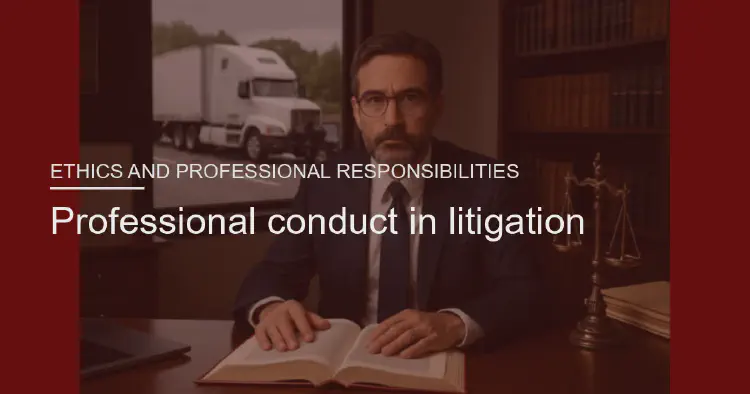Professional conduct in litigation
Truck accident cases are often complex, contentious, and high-stakes. Attorneys must adhere to strict professional conduct rules during litigation to ensure fairness, integrity, and respect for the justice system.
- Truck Accident Law Team
- 2 min read
Article 6 of 6 in Ethics and Professional Responsibilities/

Professional Conduct in Truck Accident Litigation
Duties to the Court
- Attorneys must act with candor and honesty when presenting arguments, citing case law, or introducing evidence.
- Knowingly presenting false evidence or misleading the court violates ethical rules.
- Lawyers must respect court orders and procedural rules.
Duties to Opposing Counsel
- Professionalism requires treating opposing attorneys with civility.
- Attorneys should not obstruct discovery, hide evidence, or use frivolous motions to harass.
- Cooperation in scheduling depositions and hearings is expected.
Duties to Clients
- Maintain zealous advocacy while staying within legal and ethical boundaries.
- Keep clients informed of developments and ensure decisions (such as settlement acceptance) are made with client consent.
- Avoid making unrealistic promises about case outcomes.
Handling Evidence
- Attorneys must preserve evidence, including black box data, inspection logs, and electronic records.
- Spoliation (destruction or alteration of evidence) can result in severe sanctions and damage to credibility.
- Ethical rules require timely disclosure of evidence as mandated by discovery rules.
Courtroom Conduct
- Lawyers should maintain respect for judges, jurors, and witnesses.
- Avoid aggressive tactics that cross into intimidation or harassment.
- Present arguments clearly, professionally, and without unnecessary theatrics.
Sanctions for Misconduct
- Possible consequences include fines, case dismissal, reversal of verdicts, or referral to the state bar for disciplinary action.
- Repeated or serious violations may lead to suspension or disbarment.
Importance in Truck Accident Cases
- High-value trucking cases often involve complex disputes and strong emotions.
- Professional conduct maintains fairness, credibility, and the integrity of the legal system.
- Ethical advocacy helps ensure victims and defendants receive just outcomes.
Summary: Professional conduct in truck accident litigation requires honesty with the court, civility toward opposing counsel, and ethical advocacy for clients. Attorneys must preserve evidence, respect procedures, and maintain integrity to ensure justice is served.
You might also like:
- Tags:
- Black Box
- Box Data
- Accident Litigation
- Trucking Cases
- State Bar
- Case Law
- Inspection Logs
- Importance Truck
- Disciplinary Action
- Ensure Victims
- Professional Conduct
- Electronic Records
- High Value
- Black Box Data
- Truck Accident Litigation
- Importance Truck Accident
- Helps Ensure Victims
- Accident Litigation Requires
- Box Data Inspection
- Data Inspection Logs